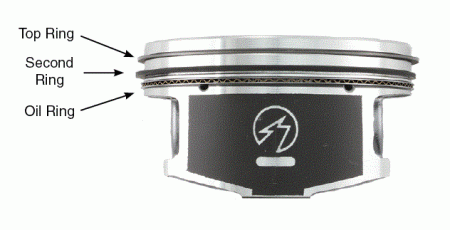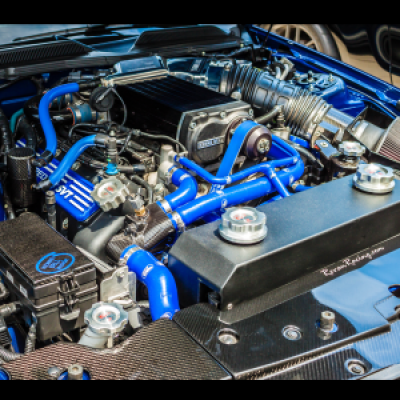Why Does My Vehicle’s Engine Burn Oil?
The simple answer: It’s probably wearing out. Over time, the piston rings have likely become worn or stuck in their grooves, preventing them from sealing tightly against the cylinder wall. The tiny gap that has formed between the ring and cylinder wall allows oil to enter the combustion chamber and burn. Worn valve seals produce the same effect. You may also be using an oil with poor resistance to heat, causing the oil to evaporate.
The detailed answer: Engines can burn oil due to a few reasons.
• Worn or stuck piston rings
• Worn valve seals
• Unstable motor oil
• Excessively low oil viscosity
Most stock automotive pistons contain three rings. The top and second rings are responsible for pressing tightly against the cylinder wall and
Valve seals also help prevent oil from entering the combustion chamber. Because oil is present to lubricate the seals and keep them pliable, some oil will burn during combustion. Even so, newer engines shouldn’t burn much oil. In fact, you shouldn’t need to add much – if any – top-off oil between oil changes, particularly if you’re using a high-quality synthetic oil. But be sure to check your oil regularly just in case.
Blame it on friction
Despite our best efforts, things eventually wear out, including engines. Worn rings can allow a gap to form between the ring face and cylinder wall. During operation, oil can slip past the rings into the combustion chamber, where it burns. Worn valve seals also contribute to oil consumption.
Stuck rings as a result of heavy deposits can result in the same scenario. Using a conventional oil that fails to resist chemical breakdown can lead to ring-land deposits, which cause the rings to stick. When this happens, the piston rings no longer float in the cylinder liner and can lead to increased oil consumption (in addition to wear).
Where did the oil go?

This is likely what happened with my Oldsmobile Intrigue back in the dark ages before I started working at AMSOIL. I used a cheap oil from a big-box retailer, and scratched my head in befuddlement each time the oil on the dipstick registered low. I even had a mechanic check for oil leaks (he found none).
Use the correct viscosity of oil
Another possibility, albeit less likely, is you’re not using the correct viscosity of motor oil for your engine. Viscosity is defined as resistance to flow, but it’s easier to think of it as thickness. The lower the viscosity, the thinner the oil. As you can imagine, thinner oil will slip past worn rings or valve seals easier than thicker oil.
The correct oil viscosity for your engine is probably printed on the oil filler cap. If not, you can find it in the owner’s manual or the AMSOIL Product Guide.
Some manufacturers recommend a range of viscosities depending on your climate (e.g. 5W-20 when it’s cold, 10W-30 when it’s above 0ºF). Using the highest recommended viscosity can help close the gap between the rings and cylinder wall, reducing oil consumption.
Use an oil that fights wear and deposits
You can fight wear and deposits that lead to oil consumption by using a high-quality synthetic motor oil. AMSOIL Signature Series Synthetic Motor Oil delivers:
• 75% more engine protection against horsepower loss and wear than required by a leading industry standard*, extending the life of vital components like pistons and cams
• 93% cleaner pistons than required by a leading industry standard*
*Based on independent testing of AMSOIL Signature Series 5W-30, in ASTM D7320 as required by API SN specification.
Personal experience
My own VW Jetta 2.0 known to use oil – we solved that with the engine flush and “classic” 5W-40 European oil. The flush seemed to cause something to do with the rings to re-seal.. Can’t say more than that but it certainly eliminated a quart usage/burning over 3000 miles.
I did this after dozens of my own customers found the same results so my own customers sold me on this AMSOIL product!!







